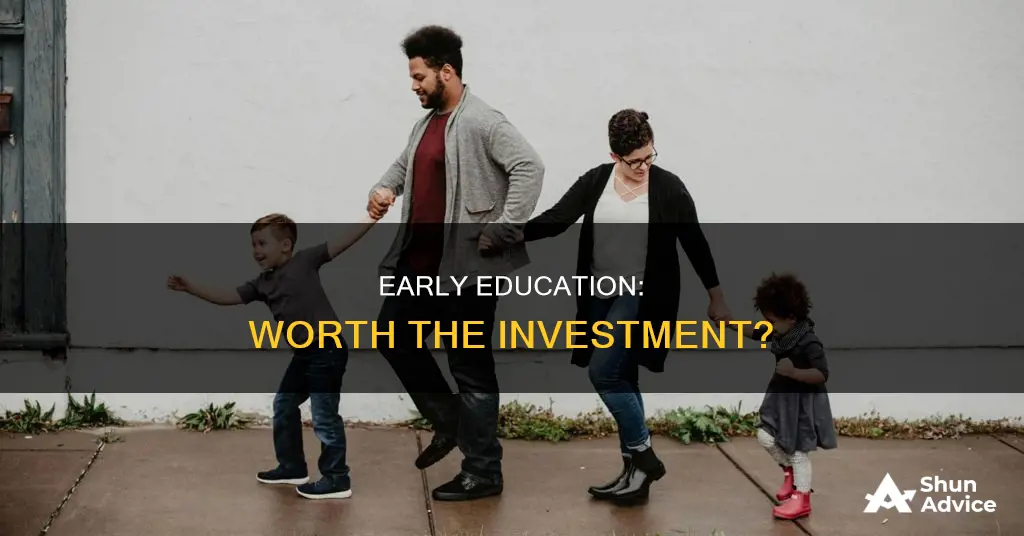
Investing in a child's early education can have a significant impact on their future success and well-being. It is not just about the financial returns, although studies have shown that quality early learning programs can yield high returns on investment. For instance, Nobel Prize-winning economist James Heckman's research found that every $1 invested in early childhood programs can bring returns of up to $16. But more importantly, early education helps children develop essential skills and knowledge that form the foundation for their future academic and life success. It promotes their cognitive, social, and emotional development, improves their health outcomes, and reduces the need for costly interventions later in their lives. Additionally, early education can have a positive impact on parents, especially those from low-income backgrounds, by enabling them to pursue employment or further education to enhance their career prospects. Therefore, investing in a child's early education is not just financially beneficial but also a worthwhile investment in their future.
| Characteristics | Values |
|---|---|
| Return on Investment | $4–$16 per $1 invested |
| Who Benefits | Children, parents, state and local government, taxpayers, society at large |
| High-Quality Early Education | Positive long-term impact on children's lives, especially low-income children |
| Parental Engagement | Improved child development and parent-child relationship |
| Empathy | Improved child development |
| Health | Reduced risk of chronic diseases such as stroke, diabetes, hypertension, heart disease, and obesity |
| Crime | Reduced incarceration rates |
| Education | Improved school readiness, higher graduation rates, and increased likelihood of pursuing higher education |
| Economic Impact | Improved employment prospects, higher earnings, and increased tax revenue |
| Social Spending | Reduced need for costly social spending |
What You'll Learn
- The financial benefits of investing in early childhood education
- The economic benefits of investing in early childhood education
- The health benefits of investing in early childhood education
- The social benefits of investing in early childhood education
- The parental benefits of investing in early childhood education

The financial benefits of investing in early childhood education
There are numerous financial benefits to investing in early childhood education, for both individuals and society at large.
Individual benefits
Investing in early childhood education can have a significant positive impact on a child's future earnings. Studies have shown that children who participate in high-quality early learning programs are more likely to graduate from high school, go on to higher education, and secure employment. This leads to higher incomes and increased buying power, which can positively contribute to the economy.
Furthermore, early childhood education can also benefit parents, particularly low-income parents, by providing them with the opportunity to seek employment or further their education, ultimately improving their career prospects and financial situation.
Societal benefits
High-quality early childhood education programs can generate savings for society by reducing the need for more expensive interventions later in a child's life. For example, studies have shown that children who participate in these programs are less likely to require special education, repeat grades, become teenage parents, or end up incarcerated—all outcomes that imply significant costs for government and society.
Additionally, early childhood education can lead to improved health outcomes, reducing healthcare costs for individuals and society. Research has shown that early interventions incorporating education, nutrition, and health can have long-term health benefits, reducing the risk of chronic diseases such as stroke and diabetes.
Financial return on investment
When it comes to financial returns, investing in early childhood education has been shown to provide a high return on investment (ROI). Nobel Prize-winning economist James Heckman's research found that every $1 invested in quality early childhood programs can yield returns between $4 and $16. Other studies have found similar results, with returns ranging from $4 to $9 per $1 invested. These returns are often higher when investing earlier in a child's life.
In conclusion, investing in early childhood education not only benefits the individual child and their family but also has far-reaching financial benefits for society as a whole. By improving educational and health outcomes and reducing societal costs, early childhood education programs provide a strong financial return on investment.
EPZ Investments: Why People Take the Risk
You may want to see also

The economic benefits of investing in early childhood education
Investing in early childhood education is a good financial investment, with studies showing that the benefits of such programs come with monetary gains and savings. When the projected benefits exceed the projected costs, these programs can be seen as "paying for themselves".
Improved health outcomes
Research by Professor James Heckman and colleagues has shown that early interventions for disadvantaged children that incorporate education, nutrition, and health can have dramatic long-term health effects. More than 30 years later, treatment group individuals were at a significantly lower risk of serious cardiovascular and metabolic diseases, such as stroke and diabetes. These findings demonstrate the potential of coordinated birth-to-age-five early childhood programs to prevent chronic disease, reduce healthcare costs, and produce a flourishing society.
Preventing the achievement gap
Gaps in knowledge and ability between disadvantaged children and their more advantaged peers tend to open up long before kindergarten and can be difficult and costly to close. Taking a proactive approach to cognitive and social skill development through investments in quality early childhood programs is more effective and economically efficient than trying to close the gap later on.
Improved earnings and reduced social spending
Quality early learning and development programs for disadvantaged children can foster valuable skills, strengthen the workforce, grow the economy, and reduce social spending. Children and parents who participate in such programs are more likely to be employed, and their enhanced buying power can positively contribute to the economy.
High rate of economic return
Nobel Prize-winning economist James Heckman's research has shown that every $1 invested in quality early childhood programs can yield returns between $4 and $16. The National Forum on Early Childhood Policy and Programs has found that high-quality early childhood programs can yield a $4–$9 return per $1 invested.
Makeup Investment: Who's Spending?
You may want to see also

The health benefits of investing in early childhood education
Investing in early childhood education has been proven to have a wide range of health benefits for children, their families, and society as a whole. Here are some key ways in which such investments can positively impact health outcomes:
Improved Health Outcomes for Children
High-quality early childhood education programs have been linked to better health outcomes for children, both in the short and long term. Research by Professor James Heckman and colleagues found that early interventions incorporating education, nutrition, and health had dramatic long-term health effects. Specifically, participants in these interventions were at a significantly lower risk of serious cardiovascular and metabolic diseases, such as stroke and diabetes, more than 30 years later. Additionally, early childhood education can lead to improved adult health, particularly a reduction in metabolic syndrome among males, which is a key risk factor for heart disease, diabetes, and other health issues.
Furthermore, early childhood education can also result in a permanent boost in IQ, which can have a positive impact on overall health and well-being. By investing in early childhood development, we can give children the best chance of growing into healthy and successful adults.
Reduced Need for Special Education and Health Services
Children who have access to quality early learning are better prepared for kindergarten and are less likely to need special education services. This not only benefits the children by providing them with a stronger foundation for their educational journey but also results in significant cost savings for taxpayers. Additionally, early childhood education can reduce the need for health services by promoting healthy habits and preventing future health issues.
Improved Parental Health and Wellbeing
Early childhood education and care programs can also positively impact the health and wellbeing of parents and caregivers. By providing subsidized child care, these programs allow parents to focus on their careers, increase their earnings, and reduce financial concerns, all of which can contribute to improved mental health. When parents suffer from fewer mental health challenges, their children are also likely to benefit from improved care and a more positive home environment.
Furthermore, early childhood education programs that offer nutritional support and health screenings can directly improve the health of parents and caregivers, as they are more likely to adopt healthier habits that benefit the entire family.
Reduced Crime and Improved Public Health
Investing in early childhood education has been shown to reduce crime rates and improve public health outcomes. Children who participate in high-quality preschool programs are less likely to engage in criminal activity, both as juveniles and adults. This not only benefits the individuals but also has a positive impact on public health and safety. Additionally, with lower crime rates, there is a reduction in the costs associated with the criminal justice system, benefiting taxpayers and society as a whole.
Improved Overall Health and Wellbeing
Overall, investing in early childhood education has been linked to improved health and wellbeing for individuals, families, and society. It promotes healthy habits, reduces the risk of chronic diseases, and contributes to a healthier and more prosperous community. By addressing health disparities and providing equal opportunities for all children to thrive, we can create a brighter and healthier future for generations to come.
Young Investors: A Growing Force
You may want to see also

The social benefits of investing in early childhood education
Investing in early childhood education has a wide range of social benefits for children, their families, and society at large. Firstly, it can prevent the achievement gap between disadvantaged children and their more advantaged peers, which tends to emerge before kindergarten and persist throughout life. Taking a proactive approach to cognitive and social skill development through quality early childhood programs is more effective and economically efficient than attempting to close this gap later on.
Secondly, early interventions that incorporate education, nutrition, and health can significantly improve health outcomes for disadvantaged children. Research by Professor Heckman and colleagues found that individuals who received early interventions were at a much lower risk of serious cardiovascular and metabolic diseases, such as stroke and diabetes, more than 30 years later. This highlights the potential of coordinated early childhood programs to prevent chronic diseases, reduce healthcare costs, and promote a healthier society.
Thirdly, early childhood education can have a positive impact on family dynamics and parental mental health. Comprehensive child care can ease the burden on caregivers by providing financial support and reducing parental stress associated with program affordability. This is crucial as parents' mental health is a predictor of their children's mental health, and parents struggling with mental health issues may face challenges in providing adequate care for their children without external support.
Furthermore, investing in early childhood education can lead to higher educational attainment and adult earnings for children, especially those from low-income backgrounds. Studies have shown that children who participate in high-quality early care programs are more likely to be employed, contributing positively to the economy through their taxes and enhanced buying power. Additionally, these children are less likely to require special education services, repeat grades, or face incarceration, resulting in significant cost savings for governments and society.
Overall, investing in early childhood education has far-reaching social benefits, including improved health, reduced social spending, enhanced employability, and a more prosperous society.
Shares to Buy: Best Bets
You may want to see also

The parental benefits of investing in early childhood education
Investing in early childhood education is a good idea not only for children but also for their parents. Here are some of the benefits:
Access to employment and education for parents: High-quality early childhood programs can provide parents with the opportunity to take on employment or further their education to improve their career prospects. This can lead to substantial and life-changing individual benefits.
Improved health outcomes: Research has shown that early interventions for children that incorporate education, nutrition, and health can have dramatic long-term health effects. These interventions can reduce the risk of serious cardiovascular and metabolic diseases such as stroke and diabetes later in life.
Financial returns: Studies have shown that every $1 invested in quality early childhood programs can yield returns of up to $16. This is because children who participate in these programs are less likely to need special education services, repeat grades, or become involved in the criminal justice system—all of which imply significant costs for parents.
Improved social and economic outcomes: Quality early learning and development programs can foster valuable skills, strengthen the workforce, grow the economy, and reduce social spending. This can lead to increased revenue and a reduced need for costly social services.
Closing the achievement gap: Gaps in knowledge and ability between disadvantaged children and their more advantaged peers can open up long before kindergarten and can be difficult and costly to close. Investing in quality early childhood programs can help to proactively address these gaps and improve cognitive and social skill development.
Your Guide to Choosing the Right Investment
You may want to see also
Frequently asked questions
Research has shown that investing in early childhood education can have a significant positive impact on children's future success. Children who have access to quality early learning programs are more prepared for kindergarten, have better language, math and social skills, and are more likely to graduate from high school and go on to college. This leads to better job opportunities and contributes to the strength of their communities. Additionally, early childhood education can help prevent health problems that may impact learning later on and can improve health outcomes in adulthood.
Studies have shown that early childhood education programs can provide a high return on investment (ROI). Nobel Prize-winning economist James Heckman's research found that every $1 invested in quality early childhood programs can yield returns between $4 and $16. Other studies have found similar results, with returns ranging from $4 to $9 per $1 invested. These returns are often due to the reduced need for more expensive interventions later in a child's life, such as special education, grade repetition, and incarceration.
Investing in early childhood education can have a positive impact on the economy by fostering valuable skills in future workers, strengthening the workforce, and reducing social spending. Quality early learning and development programs can help close the achievement gap between disadvantaged children and their more advantaged peers, leading to a more skilled and productive workforce. Additionally, parents who have access to quality early childhood education for their children may have more opportunities to work or further their education, contributing to the economy through enhanced buying power and tax revenue.
One example is the Perry Preschool program, a high-quality program for 3-5-year-olds developed in Michigan in the 1960s. A study of this program estimated a return to society of between $7 and $12 for each $1 invested. Another example is the North Carolina Abecedarian preschool program, which tracked participants' education, employment, and health outcomes up to age 35 and found significant health benefits, including a reduced incidence of chronic diseases such as hypertension, heart disease, diabetes, and obesity.
There are several ways to save or invest money for a child's education. One option is to make monthly contributions to a registered education savings plan (RESP) to access government grants and tax benefits. Another option is to use Tax-Free Savings Accounts (TFSA) to buy stocks, ETFs, mutual funds, or bonds. Mutual funds, particularly equity mutual funds, are also a popular choice, as they offer potential returns that can match the rate of education cost inflation. Additionally, investment bonds purchased through a life insurance company can provide flexibility and tax benefits for saving towards education expenses.







